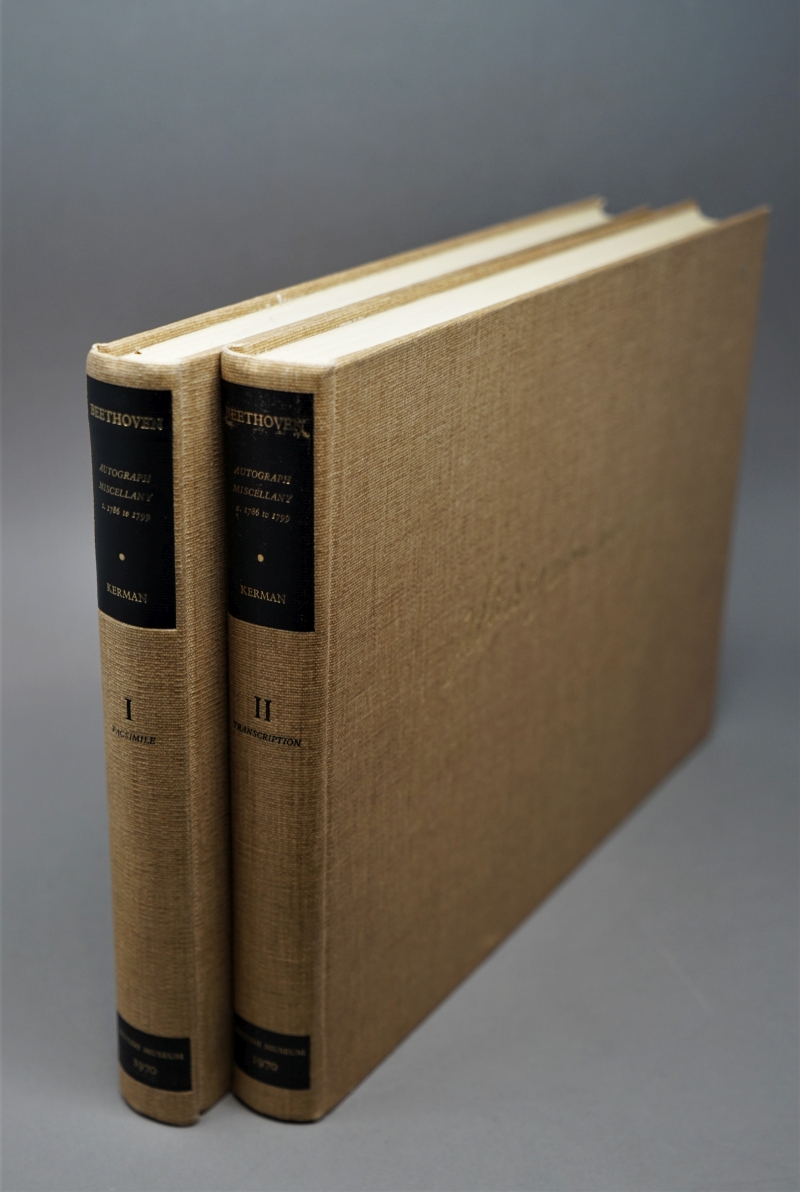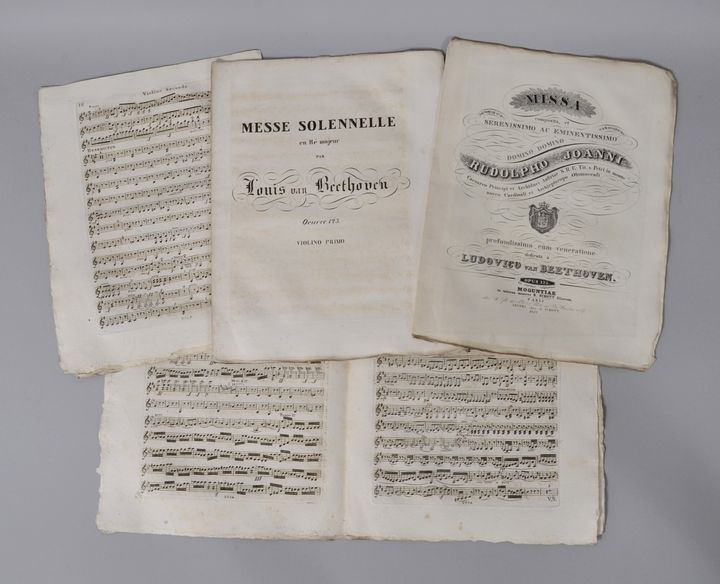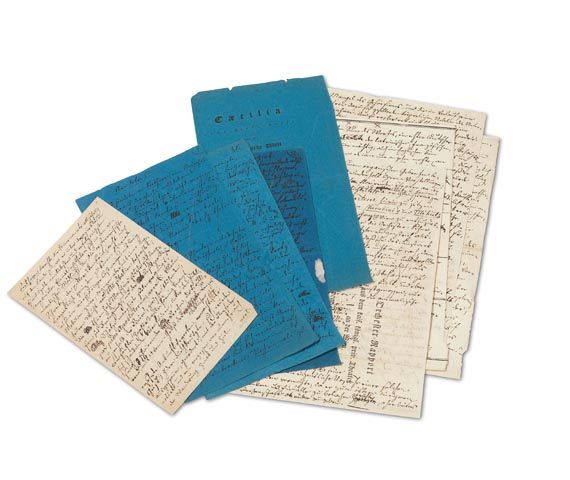BEETHOVEN, Ludwig van (1770-1827). IMPORTANT AUTOGRAPH LETTER SIGNED to Count Moritz Lichnowsky, Baden, 21 September 1814, concerning the dedication of op.90 to the count, his expressions of friendship, his hopes regarding Lord Castlereagh, and including a three bar musical setting of part of the text of the letter, black ink, 4 pages on a bifolium, 4vo (approximately 220 x 190mm.) , framed and glazed (minor perforations, not affecting text). Beethoven writes to Count Moritz Lichnowsky (1771-1837), the younger brother of one of his earliest patrons in Vienna, Prince Karl Lichnowsky. He thanks the Count for remembering him and sends his best greetings to the Princess [Maria] Christiane, the widow of Prince Karl. Relating that he took a walk with a friend to the Brühl, Beethoven mentions that the Count's name was especially mentioned and then by coincidence he received his letter. Receipt of the letter forces Beethoven to reveal something which he especially wished to keep a secret 'sahe ich ihnen, dass bald eine Sonata von mir erscheinen wird, die ich ihnen gewidmet.' Beethoven writes that he needs no new reason for expressing his friendship in public and expects nothing from Lichnowsky in return. 'Nie habe ich vergessen, was ich ihnene überhaupt alle schuldig bin, wenn auch ein unglückseliges Ereigniss Verhältnisse hervorbrachte, wo ich es nicht so, wie ich wünschte, zeigen konnte', Beethoven continues and in the final paragraph goes on to refer to Lord Castlereagh, spelt 'Castleregt' by Beethoven, writing that the matter has been set going in the best way and recommending that Castlereagh does not write about the work on Wellington until he has heard it. He closes by announcing that he will soon go into town [Vienna] and then he and the Count can discuss everything about a grand concert. Nothing can be done with the Court. He has made an offer and then follows three bars setting 'allein allein allein, jedoch Silentium.' Beethoven signs off with further expressions of devotion to the Count and the Princess. The paino sonata, his first in four years, which Beethoven dedicated to Lichnowsky was op.90 in E minor, completed on 16 August 1814, and published by Steiner the following year. Beethoven also dedicated the Prometheus Variations , op.35, to him and wrote a canon (WoO.183) in 1823 for him. Beethoven's relationship with the Lichnowsky family was longstanding. As a young man he lived in Prince Karl's household from 1793-1795 but in 1806 relations became strained for a time, following the famous disagreement on a visit undertaken by the Prince and Beethoven to Silesia when the latter refused to perform at his patron's command. It is presumably to this unpleasantness that Beethoven refers when he writes of 'an unfortunate event which prevented me from proving my gratitude.' The friend with whom Beethoven walked to the Brühl is most likely the friend for whom Beethoven wrote the canon Freundschaft ist die Quelle (WoO.164). The autograph of this canon is dated 20 September 1814, the 'yesterday' of this letter. The last paragraph of the letter concerns Beethoven's hopes for Wellingtons Sieg oder Die Schlacht bei Vittoria (the Battle Symphony ), op.91 of 1813. Through Viscount Castlereagh, the British Foreign Secretary, who was in the city for the Congress of Vienna at the end of the Napoleonic Wars, Beethoven was hoping to obtain recognition from the Prince Regent for the dedication of the Battle Symphony . Beethoven produced a number of works for the Congress and in many ways the period when the Congress was sitting represented the highwater mark of the composer's fame and popularity in Vienna, when his works were performed before and dedicated to the assembled sovereigns. The three bar setting of part of the text is WoO.205b. The letter is published in Emily Anderson, The Letters of Beethoven , London, 1985, vol.1, p.470, no.498, where the autograph is given as not traced. Anderson took the text from A.B.Marx, Ludwig van
BEETHOVEN, Ludwig van (1770-1827). IMPORTANT AUTOGRAPH LETTER SIGNED to Count Moritz Lichnowsky, Baden, 21 September 1814, concerning the dedication of op.90 to the count, his expressions of friendship, his hopes regarding Lord Castlereagh, and including a three bar musical setting of part of the text of the letter, black ink, 4 pages on a bifolium, 4vo (approximately 220 x 190mm.) , framed and glazed (minor perforations, not affecting text). Beethoven writes to Count Moritz Lichnowsky (1771-1837), the younger brother of one of his earliest patrons in Vienna, Prince Karl Lichnowsky. He thanks the Count for remembering him and sends his best greetings to the Princess [Maria] Christiane, the widow of Prince Karl. Relating that he took a walk with a friend to the Brühl, Beethoven mentions that the Count's name was especially mentioned and then by coincidence he received his letter. Receipt of the letter forces Beethoven to reveal something which he especially wished to keep a secret 'sahe ich ihnen, dass bald eine Sonata von mir erscheinen wird, die ich ihnen gewidmet.' Beethoven writes that he needs no new reason for expressing his friendship in public and expects nothing from Lichnowsky in return. 'Nie habe ich vergessen, was ich ihnene überhaupt alle schuldig bin, wenn auch ein unglückseliges Ereigniss Verhältnisse hervorbrachte, wo ich es nicht so, wie ich wünschte, zeigen konnte', Beethoven continues and in the final paragraph goes on to refer to Lord Castlereagh, spelt 'Castleregt' by Beethoven, writing that the matter has been set going in the best way and recommending that Castlereagh does not write about the work on Wellington until he has heard it. He closes by announcing that he will soon go into town [Vienna] and then he and the Count can discuss everything about a grand concert. Nothing can be done with the Court. He has made an offer and then follows three bars setting 'allein allein allein, jedoch Silentium.' Beethoven signs off with further expressions of devotion to the Count and the Princess. The paino sonata, his first in four years, which Beethoven dedicated to Lichnowsky was op.90 in E minor, completed on 16 August 1814, and published by Steiner the following year. Beethoven also dedicated the Prometheus Variations , op.35, to him and wrote a canon (WoO.183) in 1823 for him. Beethoven's relationship with the Lichnowsky family was longstanding. As a young man he lived in Prince Karl's household from 1793-1795 but in 1806 relations became strained for a time, following the famous disagreement on a visit undertaken by the Prince and Beethoven to Silesia when the latter refused to perform at his patron's command. It is presumably to this unpleasantness that Beethoven refers when he writes of 'an unfortunate event which prevented me from proving my gratitude.' The friend with whom Beethoven walked to the Brühl is most likely the friend for whom Beethoven wrote the canon Freundschaft ist die Quelle (WoO.164). The autograph of this canon is dated 20 September 1814, the 'yesterday' of this letter. The last paragraph of the letter concerns Beethoven's hopes for Wellingtons Sieg oder Die Schlacht bei Vittoria (the Battle Symphony ), op.91 of 1813. Through Viscount Castlereagh, the British Foreign Secretary, who was in the city for the Congress of Vienna at the end of the Napoleonic Wars, Beethoven was hoping to obtain recognition from the Prince Regent for the dedication of the Battle Symphony . Beethoven produced a number of works for the Congress and in many ways the period when the Congress was sitting represented the highwater mark of the composer's fame and popularity in Vienna, when his works were performed before and dedicated to the assembled sovereigns. The three bar setting of part of the text is WoO.205b. The letter is published in Emily Anderson, The Letters of Beethoven , London, 1985, vol.1, p.470, no.498, where the autograph is given as not traced. Anderson took the text from A.B.Marx, Ludwig van





.jpg)







Try LotSearch and its premium features for 7 days - without any costs!
Be notified automatically about new items in upcoming auctions.
Create an alert